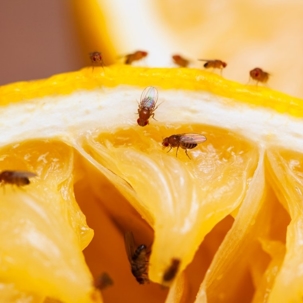Are Fruit Flies Poisonous?
Fruit flies, scientifically known as Drosophila melanogaster, are not poisonous to humans. They are tiny flies that feed primarily on decaying fruits and vegetables, as well as other organic matter. While they may be considered a nuisance when they infest your kitchen or fruit bowl, they do not pose a direct threat to human health in terms of toxicity.
However, it's essential to practice good hygiene and food safety measures to prevent fruit fly infestations. Fruit flies can carry bacteria and other pathogens on their bodies, which can potentially contaminate food. Therefore, it's advisable to store fruits and vegetables properly, keep kitchen surfaces clean, and dispose of overripe or rotting produce to deter fruit flies from breeding and spreading.
Fruit flies are not poisonous, but they can indirectly impact human health by potentially spreading contaminants from one place to another. Proper sanitation and pest control measures are essential for managing fruit fly populations in your home.
How Do Fruit Flies Spread Diseases?
Fruit flies (Drosophila melanogaster) themselves are not known to be direct vectors for transmitting diseases to humans. Unlike some other insects like mosquitoes or ticks, which can transmit diseases such as malaria or Lyme disease, fruit flies do not have a biological mechanism for transmitting pathogens that can affect human health in the same way.
However, fruit flies can contribute to the spread of diseases or foodborne illnesses in the following ways:
Contamination of Food: Fruit flies are attracted to rotting or overripe fruits and vegetables, as well as other decaying organic matter. When they land on such materials, they can pick up bacteria, yeasts, or molds. If these contaminated fruit flies come into contact with human food, they can transfer these microorganisms, potentially leading to foodborne illnesses. Common foodborne pathogens that may be involved include Salmonella, Escherichia coli (E. coli), and Listeria.
Cross-Contamination: Fruit flies are known to move between different surfaces and food items in your kitchen. As they traverse various areas, they can carry potential contaminants with them. This cross-contamination can increase the risk of foodborne illness if you do not practice proper food safety and hygiene, such as washing fruits and vegetables before consumption and cleaning food preparation surfaces regularly.
Attracting Other Pests: Fruit fly infestations can attract other pests, such as cockroaches or rodents, which are known carriers of diseases. An uncontrolled infestation of fruit flies could indirectly contribute to the spread of diseases through the presence of these secondary pests.
Allergies and Asthma: While not a direct disease transmission concern, the presence of fruit flies can trigger allergic reactions and exacerbate asthma symptoms in individuals who are sensitive to allergens found in their feces, saliva, or shed body parts.
To minimize the potential for foodborne illnesses or other health risks associated with fruit flies, it is crucial to maintain good hygiene in your kitchen, store fruits and vegetables properly, and take measures to control fruit fly infestations when they occur. Regular cleaning, sealing food containers, and promptly disposing of overripe produce can help mitigate the risks associated with these insects.
Diseases Fruit Flies Spread
Fruit flies can potentially spread various foodborne pathogens when they come into contact with contaminated food. Some of the common foodborne pathogens that may be spread by fruit flies include:
Salmonella: Fruit flies can pick up Salmonella bacteria from contaminated surfaces or decaying organic matter. When they land on food, they can transfer these bacteria, leading to Salmonella infection if the contaminated food is consumed. Salmonella infections can cause symptoms such as diarrhea, abdominal cramps, fever, and vomiting.
Escherichia coli (E. coli): Certain strains of E. coli, such as E. coli O157:H7, can cause severe foodborne illness. Fruit flies can transfer E. coli bacteria to food items, particularly if they have been in contact with fecal matter or contaminated water. Consumption of food contaminated with E. coli can result in symptoms ranging from mild gastrointestinal discomfort to severe complications, including kidney damage.
Listeria: Listeria monocytogenes is a bacterium that can grow in refrigerated and processed foods. Fruit flies can carry Listeria bacteria from contaminated sources to food, leading to Listeriosis if the contaminated food is consumed. Listeriosis can cause flu-like symptoms, meningitis, and even severe complications, especially in vulnerable populations such as pregnant women and the elderly.
Campylobacter: Fruit flies can potentially carry Campylobacter bacteria, which can lead to food poisoning when transmitted through contaminated poultry, unpasteurized milk, and other foods. Campylobacter infection can result in symptoms such as diarrhea, abdominal pain, fever, and muscle aches.
Staphylococcus aureus: Fruit flies can transfer Staphylococcus aureus bacteria from contaminated surfaces to food. Staphylococcal food poisoning occurs when the bacteria produce toxins in the food, leading to symptoms like nausea, vomiting, diarrhea, and abdominal cramps.
Norovirus: While fruit flies themselves do not carry norovirus, they can potentially transfer the virus from contaminated surfaces to food or indirectly contribute to the spread of the virus in settings such as kitchens or food preparation areas. Norovirus is a highly contagious virus that causes gastroenteritis, with symptoms like vomiting, diarrhea, and stomach cramps.
The risk of foodborne illness transmission by fruit flies can be significantly reduced by practicing proper food safety and hygiene measures, including thorough washing of fruits and vegetables, refrigerating perishable foods promptly, and maintaining a clean kitchen environment to minimize the presence of these insects.

